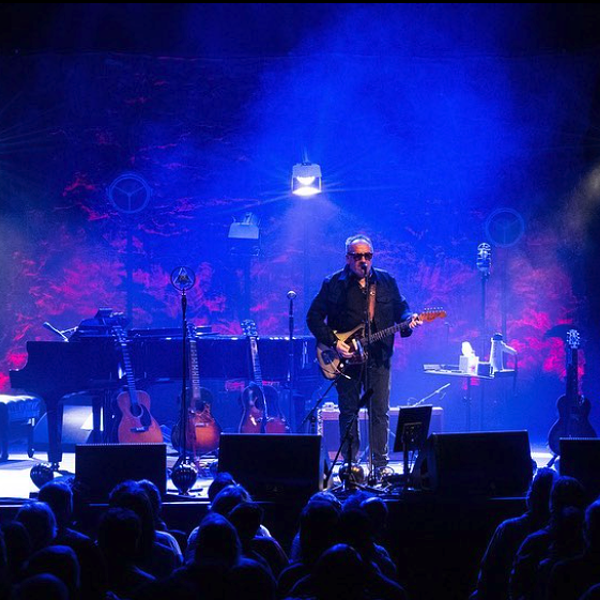Nearly 40 years after its release, Remain in Light's groundbreaking fusion of African polyrhythms, funk, electronics, and New York new wave has seen the set dubbed one of the most influential albums of all time. In 2017, the Library of Congress selected it for inclusion in the National Recording Registry for its being "culturally, historically, or artistically significant," and it played a crucial part in introducing the music of Afrobeat legend Fela Kuti, a strong influence on the band during the album's making, to Western audiences (see Brooklyn band Antibalas and the hit Off-Broadway musical "Fela").
Last year, the iconic Beninese singer Angelique Kidjo—called "the undisputed queen of African music" by the London Daily Telegraph—released a brilliant song-for-song cover of Remain in Light, which was produced by Jeff Bhasker (Kanye West, Rolling Stones, Beyonce) and won the enthusiastic endorsement of Byrne (the head Head himself even joined Kidjo onstage at Carnegie Hall when she performed the music there). Angelique Kidjo, who answered the questions below by email, will perform Talking Heads' Remain in Light at UPAC in Kingston on April 11 at 7:30pm. Tickets are $46, $56, and $66.
—Peter Aaron
Can you tell us about the first time you encountered Remain in Light—what was it about the album that attracted you to it and made an impression on you?
I never thought anyone could suffer from music starvation! When I arrived in Paris fleeing the Communism dictatorship in my country, I felt that the world had passed me by musically. So one day I tagged along with some students from my music school to listen to new music in a party. That's when among all the songs played on cassette came [the single] "Once in a Lifetime." I reacted to it, as it felt so familiar. I wondered immediately how my whole family would have danced and reacted to this music that sounded very African to me. At the same time as I was singing along with the chorus the familiarity stopped, as I was feeling homesick and anxious at the same time because of the lyrics. But it made a big impression on me. Even though my fellow students thought there was nothing African about it. I learned, later on, that the band and [producer] Brian Eno were inspired by Fela Kuti's music at the time.
Since the original Remain in Light was very much influenced by African music, in a way your being an African artist and reimagining the songs takes the music full circle. Obviously, you bring your personal perspective as an individual artist to the project, but would you say it feels more influenced by the Talking Heads side of the music or the African side? Which side would you say you feel more strongly?
For me it wasn't something I thought about. I just followed my inspiration. It was obvious from the first song that I should be using the call and response that we have in Beninese traditional music and develop it more by using some proverbs from my country that have many layers of meaning. Everyone has been telling me that the lyrics of the original album were absurd—but not for me. I tried to decipher proverbs used by elderly people and mix their meaning with the Talking Heads lyrics. And somehow, magical, it was working!
For some of the songs you've also added some new, socially relevant lyrics. The version of "The Great Curve," which touches on the empowerment of women, is an example of this. What message are you hoping listeners will take from your new lyrics for this song? How about your additional lyrics for some of the other songs, like "Seen and Unseen" or "Born Under Punches"?
One thing I know for sure is that we all have to live in the same ecosystem. There's no other Earth out there. So, if we don't take care of Mother Earth, we have no future. It is the same thing if we do not care for women's rights and women's empowerment! That is the message I want people to think about when they listen to "The Great Curve": Our survival depends on how we treat these issues.
It seems that African music is more popular now in America than it ever has been before. As someone who's lived in New York for some time and toured America many times, why do you think this is the case? It has been popular in France and other European countries for some time, but what are your thoughts on Afropop, Afrobeat, and traditional African music having an increasing appeal here more recently?
Life is a cycle. African music gave birth to almost every modern form of music worldwide because of the history of slavery. In a way, music is constantly reminding us of our shared humanity. It flows free from any agenda. It's embedded in our DNA. Social media has shrunk the world and so now the African youths are witnessing this culture. So the music continues its journey back and forth between continents.
You've described your music as "a weapon for building bridges" and said that "We think there is things to divide us, but not much divides us." Right now, though, to many people it certainly feels like there is a lot division in the world, so some people who are anxious about this feeling could be confused when you say there is "not much" that divides people. What would you say to them, to clarify what you mean and to give them hope?
Before the birth of nations, flags, anthems, and the way our societies are built, we were all one people. What are the fundamental things that we all need? Love, health, the right to be able to raise our children the best we can, access to good education and living together, and to speak freely. There's no one who could survive alone, and, in that spirit, we need a world that is much more equal. My experience travelling all over the world [shows] that we are more alike than we're thinking we are. If we chose to live divided, if we chose hate and fear over love and kindness, we are just isolating [ourselves] from the rest of the world, and this is just not sustainable. There is a lot of anger and frustration. Is the solution hate and fear? Personally, I think that hate and fear are cowardly choices. Living together demands courage, honesty, and continual challenges. It's not by hurting people that we will prevail, but by finding common ground to build a new world together while retaining our own cultures. So let's remain in light!


















